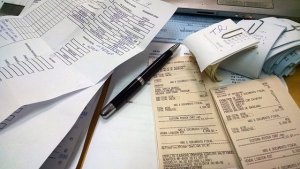The team at MoneyThumb hopes all of you had a great Thanksgiving yesterday. Since this is the time of year our minds begin turning to tax season, we thought you'd like definitive information on exactly how long you should keep IRS tax records. The Rules of Thumb blog of MoneyThumb has gathered together all the information you will need to know exactly which tax documents to keep and for how long. You might even want to print out this post.
In general, the IRS has three years from the due date of the return or the date on which the return was filed, whichever is later, to audit and adjust the return. However, the IRS has six years to audit a return if a person fails to report over 25% of gross income. If a return is not filed, or a fraudulent return has been filed, the IRS can audit records for that tax year at any time.
For tax returns and forms W-2, we recommend keeping them at least 7 years or permanently if you could. Your tax returns provide support in case the IRS contends you did not file a return or filed a fraudulent return. Keep forms W-2 in case you need to prove earnings or Social Security and Medicare contribution to Social Security Administration many years later.
For documents that have future tax relevance such as cost of stocks purchased, IRA contributions, closing documents of your houses, improvement costs of the houses, etc., you will need these documents to calculate gains or losses when you sell these assets. We recommend keeping these documents at least 4 years after you sell and report the sold assets on your tax return.
To make sure we are clear with IRS rules for how long to keep tax documents, here are the guidelines from the IRS website:
Period of Limitations that apply to income tax returns
- Keep records for 3 years if situations (4), (5), and (6) below do not apply to you.
- Keep records for 3 years from the date you filed your original return or 2 years from the date you paid the tax, whichever is later if you file a claim for credit or refund after you file your return.
- Keep records for 7 years if you file a claim for a loss from worthless securities or bad debt deduction.
- Keep records for 6 years if you do not report income that you should report, and it is more than 25% of the gross income shown on your return.
- Keep records indefinitely if you do not file a return.
- Keep records indefinitely if you file a fraudulent return.
- Keep employment tax records for at least 4 years after the date that the tax becomes due or is paid, whichever is later.
It's important to understand that this is just a small representative sampling. You should, for example, also keep all records relating to your home if you take a mortgage interest deduction. Small business owners need to track their expenses with particularity. The simple answer is, if you put it on your tax return you should keep the documentation.
State Income Tax Returns
Finally, the Rules of Thumb blog from MoneyThumb wants our reader to note that every state will have its own rules about the statute of limitations on an audit. Some states expand the window to four or even five years. If you plan on throwing out your old income statements and receipts, be certain to look up your state's individual rules on the subject so that you don't find yourself subject to an unanticipated investigation.





















Add comment